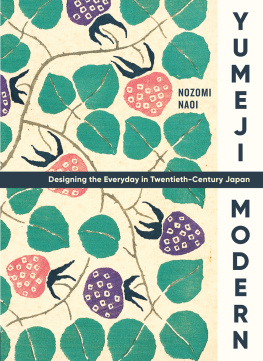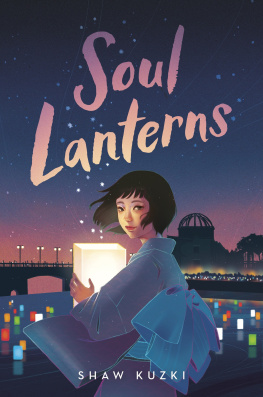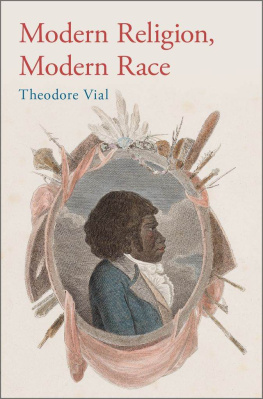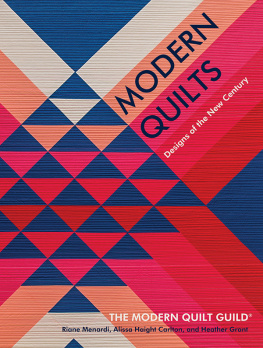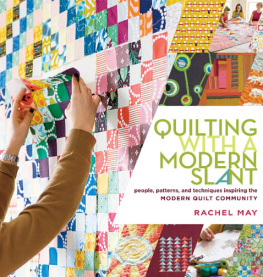Nozomi Naoi - Yumeji Modern
Here you can read online Nozomi Naoi - Yumeji Modern full text of the book (entire story) in english for free. Download pdf and epub, get meaning, cover and reviews about this ebook. year: 2020, publisher: University of Washington Press, genre: Detective and thriller. Description of the work, (preface) as well as reviews are available. Best literature library LitArk.com created for fans of good reading and offers a wide selection of genres:
Romance novel
Science fiction
Adventure
Detective
Science
History
Home and family
Prose
Art
Politics
Computer
Non-fiction
Religion
Business
Children
Humor
Choose a favorite category and find really read worthwhile books. Enjoy immersion in the world of imagination, feel the emotions of the characters or learn something new for yourself, make an fascinating discovery.
- Book:Yumeji Modern
- Author:
- Publisher:University of Washington Press
- Genre:
- Year:2020
- Rating:3 / 5
- Favourites:Add to favourites
- Your mark:
- 60
- 1
- 2
- 3
- 4
- 5
Yumeji Modern: summary, description and annotation
We offer to read an annotation, description, summary or preface (depends on what the author of the book "Yumeji Modern" wrote himself). If you haven't found the necessary information about the book — write in the comments, we will try to find it.
Yumeji Modern — read online for free the complete book (whole text) full work
Below is the text of the book, divided by pages. System saving the place of the last page read, allows you to conveniently read the book "Yumeji Modern" online for free, without having to search again every time where you left off. Put a bookmark, and you can go to the page where you finished reading at any time.
Font size:
Interval:
Bookmark:

YUMEJI MODERN
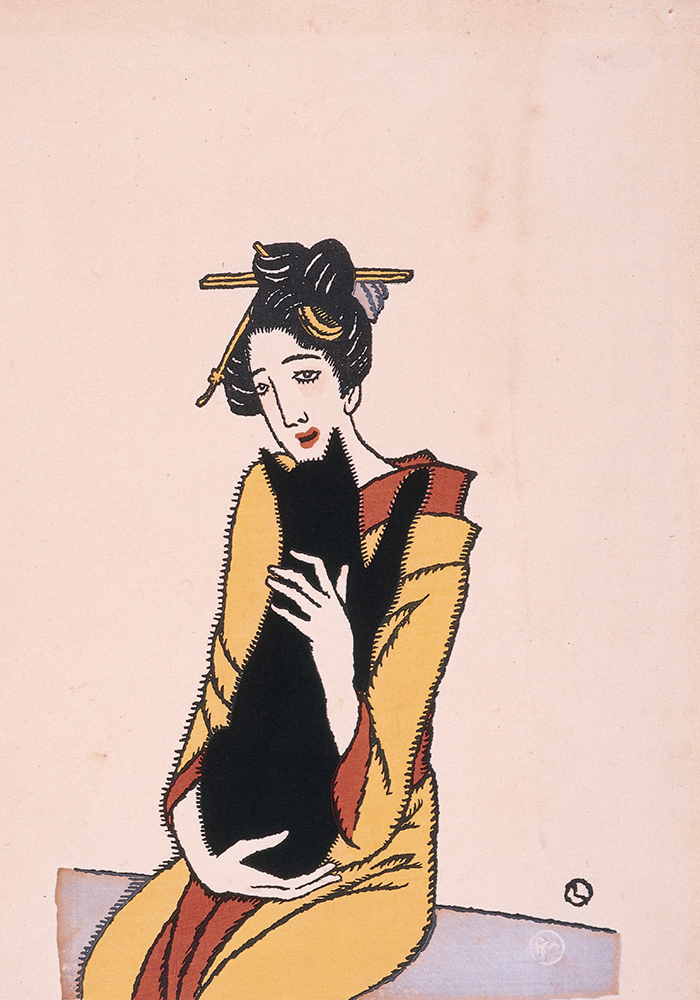
YUMEJI
MODERN
DESIGNING THE EVERYDAY IN
TWENTIETH-CENTURY JAPAN
Nozomi Naoi
UNIVERSITY OF WASHINGTON PRESS
Seattle
| Yumeji Modern is made possible by a collaborative grant from the Andrew W. Mellon Foundation. |
| Publication of this book has been aided by a grant from the Millard Meiss Publication Fund of the College Art Association. |
Yumeji Modern was also supported by a Japan Art History Forum First Book Subvention and by a Yale-NUS College Subvention Grant and Start-Up Grant.
Copyright 2020 by the University of Washington Press
Printed and bound in Korea
Design by Katrina Noble
Composed in Minion Pro, typeface designed by Robert Slimbach
24 23 22 21 205 4 3 2 1
All rights reserved. No part of this publication may be reproduced or transmitted in any form or by any means, electronic or mechanical, including photocopy, recording, or any information storage or retrieval system, without permission in writing from the publisher.
UNIVERSITY OF WASHINGTON PRESS
uwapress.uw.edu
LIBRARY OF CONGRESS CATALOGING-IN-PUBLICATION DATA
Names: Naoi, Nozomi, author.
Title: Yumeji modern : designing the everyday in twentieth-century Japan / Nozomi Naoi.
Description: Seattle : University of Washington Press, [2020] | Includes bibliographical references and index.
Identifiers: LCCN 2019034388 (print) | LCCN 2019034389 (ebook) | ISBN 9780295746838 (hardcover) | ISBN 9780295746845 (ebook)
Subjects: LCSH: Takehisa, Yumeji, 1884-1934Criticism and interpretation. | Art and societyJapanHistory20th century.
Classification: LCC N7359.T3495 N36 2020 (print) | LCC N7359.T3495 (ebook) | DDC 700.952/0904dc23
LC record available at https://lccn.loc.gov/2019034388
LC ebook record available at https://lccn.loc.gov/2019034389
The paper used in this publication is acid free and meets the minimum requirements of American National Standard for Information SciencesPermanence of Paper for Printed Library Materials, ANSI z39.481984.
For my parents, Wako and Katsuhiko
Words alone cannot express how grateful I am for all the support and encouragement I have received from many people along the way. I am especially thankful for the generous support and guidance that I have received over the years from my mentors, Yukio Lippit and Melissa McCormick. Their vast knowledge of Japanese art and their rich ways of approaching research have had a tremendous impact on my development as an art historian. It has been an incredible experience to be exposed to their intellectual insight and passion for the field.
I would like to acknowledge Eugene Wang at Harvard University, who has long guided me, and other Harvard faculty who have inspired me: Neil Levine, David Roxburgh, Benjamin Buchloh, Ewa Lajer-Burcharth, Hugo van der Velden, Edwin Cranston, Theodore Bestor, Helen Hardacre, Tomiko Yoda, Alexandar Zahlten, and David Howell. Deanna Dalrymple, Debbie Sears, Thomas Batchelder, Nanni Deng, Kuniko McVey, Fumiko Cranston, Ted Gilman, Stacie Matsumoto, and Catherine Glover deserve special mention. I am also grateful for the compassion and friendship of Maggie Cao, Jaya Remond, Hye-won Yoon, Nadia Marx, Anastassiia Botchkareva, Merih Danali, Cara Rachele, Catherine Girard, and Joshua ODriscoll. My fellow Asianists have also been a valuable support system. Without Mark Erdmann, Akiko Walley, Yoon-mi Kim, Rachel Saunders, and Michelle Wang, who have been both colleagues and wonderful mentors, I would not be where I am today. Special thanks also goes to Yurika Wakamatsu, Ren Wei, Kit Brooks, Steffani Bennett, Alan Yeung, Bing Huang, Allison Miller, Akiko Yamagata, Mycah Braxton, Fabienne Helfenberger, Fletcher Coleman, Alex Ziliang Liu, Esra Gokce Sahin, and Shea Ingram. I am truly indebted to the wisdom and generosity from Kristina Kleutghen and Phillip Bloom, whose help made the book possible.
My relationship with art history began at Carleton College, and I am infinitely grateful to Kathleen Ryor. My experiences at the Museum of Fine Arts, Boston, also formed my deep interest in printed material. I am indebted to the wonderful group of curators and staff who were part of the Department of Art of Asia, Oceania, and Africa during my time there: Joe Earle, Anne Morse Nishimura, Sarah Thompson, Hao Sheng, Joe Scheier-Dolberg, Quintana Heathman, Abraham Schroeder, Jessica Nemczuk, and Angie Simonds.
I have been fortunate to receive generous research funding from Harvard University, Waseda University, and the Reischauer Institute. I would like to express my sincere gratitude to Tano Yasunori and Iwakiri Shinichiro, who guided me toward materials that became an important part of this book. I very much appreciate the warm support from Okuma Seisaku, Mashino Keiko, Shiromasa Akiko, Ishii Kae, and Sato Kaori. In Japan, many scholars and curators have assisted me in furthering my research on the artist Takehisa Yumeji. I owe a tremendous debt of gratitude to Curator Ota Shoko at the Kanazawa Yuwaku Yumeji-kan Museum and Curator Kojima Hiromi at the Yumeji Art Museum, Okayama, Japan. I would also like to thank the Takehisa Yumeji Ikaho Museum. Special mention goes to Kuwahara Noriko and Takagi Hiroshi for their intellectual insight.
The completion of this book was made possible by the generous support from Yale-NUS College and the Georgette Chen Fellowship. At Yale-NUS, I have found an exceptionally supportive community of colleagues and friends. I would like to acknowledge Rajeev Patke, Mira Seo, Scott Cook, Naoko Shimazu, Jeannette Ickovics, Joanne Roberts, Emanuel Mayer, Gabriele Koch, Andrew Hui, Shaoling Ma, Navin Rajagobal, Robin Zheng, Zachary Howlett, Nienke Boer, Jay Garfield, Sandra Field, Nancy Gleason, Jessica Hanser, Anju Mary Paul, and Pericles Lewis among many others. I especially appreciate the time colleagues took to read my initial chapter at the workshop for the Gender and Modernities Clusters. My colleagues in the Arts and Humanities major, James Jack, Yanyun Chen, Chee Keng Lee, Robin Hemley, Heidi Stalla, Lawrence Ypil, Pattaratorn Chirapravati, and Meredith Morse, have been a source of encouragement. Maria Taroutina deserves special mention for her generosity, patience, and consistent support during the completion of this book. Visiting faculty members from Yale University were great mentors; I would like to express my thanks to Robert Nelson, Margaret Olin, and Edward Cooke. I have also profited from colleagues at the Department of Japanese Studies at the National University of Singapore, especially Beng Choo Lim and Deborah Shamoon. Generous funding from the Yale-NUS Book Manuscript Workshop Grant allowed me the opportunity to discuss the subject with leading scholars in my field. I am deeply indebted to the expertise and knowledge that Gennifer Weisenfeld, Alicia Volk, and Sarah Frederick so generously shared with me. This book would not have been possible without their support and incredible scholarship.
Font size:
Interval:
Bookmark:
Similar books «Yumeji Modern»
Look at similar books to Yumeji Modern. We have selected literature similar in name and meaning in the hope of providing readers with more options to find new, interesting, not yet read works.
Discussion, reviews of the book Yumeji Modern and just readers' own opinions. Leave your comments, write what you think about the work, its meaning or the main characters. Specify what exactly you liked and what you didn't like, and why you think so.

